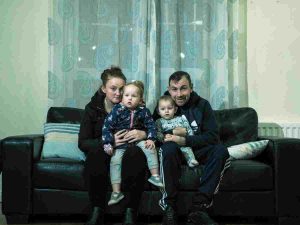A Channel 4 Dispatches documentary on DWP disability benefits came right out of the poverty porn playbook of the worst trash TV shows of the last decade. However, it’s little wonder when far-right foghorn and former Spectator editor Fraser Nelson (until just a few weeks ago we might add) was fronting the programme.
The demonising title said it all: Britain’s Benefits Scandal. Cue, a forty-five minute frothing-at-the-mouth foray into Nelson’s favourite past-time: punching down on chronically ill and disabled people claiming benefits. Needless to say, it was also replete with factual inaccuracies to boot, to fuel its horrendous hatchet job.
In the lead up to its airing, the Canary – and many others on social media – highlighted that Nelson’s benefit claimant-bashing reputation precedes him. But there was something even more significant we also pointed out, and the documentary completely failed to mention. This was that he LITERALLY works for the organisation at the centre of the programme. That would be former DWP boss Iain Duncan-Smith’s notorious rightwing think tank, the Centre for Social Justice (CSJ).
In short, in the face of Nelson’s significant conflict of interest, the whole documentary should be consigned to the dustbin of dark money think tank propaganda. Instead, it got a prime-time TV slot on one of the UK’s most watched news channels.
Channel 4: Britain’s Benefit Scandal was bullshit benefit bashing at its worst
The Canary went through this shitshow of insipid drivel so you don’t have to. Spoiler alert: the true scandal is that the broadcaster ever gave Nelson a budget for this trumped up ‘documentary’-come-CSJ advertorial.
Break out your benefit claimant-bashing bingo card – because it had them all.
It started how all good documentaries do – with presenter Nelson scratching his head and promising to take viewers right up the history of Britain’s so-called benefits scandal. Only of course, he doesn’t actually do this at all. In the first few minutes, he opined:
As a journalist, what I can’t work out is how such a huge scandal is going almost completely unnoticed. When unemployment hit 3 million under Margaret Thatcher, there was outrage. But, when the number on sickness benefits hits 3 million, almost nobody seems to ask why, how on earth we got to this stage, or what life is actually like, for those now caught in the system.
Almost nobody? Except quite literally every single rightwing corporate media outlet and politicians of both major UK parties, incessantly, more like.
Naturally, Nelson and his guests made their fair share of ableist comments throughout as well. In one scene, he did the “you don’t look disabled” ableism 101:
A crass comment. You look healthy. You’re articulate. You can’t see pain. Not all disabilities are visible. The ableism In the journalist comment. Horrendous. Shameful
— Paula Peters (@paulapeters2) December 2, 2024
As a Consultant Clinical Psychologist who works with many people on benefits nationally, let me truth-check #Dispatches:
– Benefits are grossly inadequate
– The system is dehumanising
– Invisible disabilities are as valid as visible ones.Stop the cruelty. Uplift #benefits.
— Dr Jay Watts (@Shrink_at_Large) December 2, 2024
Others talked about chronically ill and disabled people not in work as being “written off” or “put on the scrapheap”. Implying of course that people not powering the billionaire capitalist wet dream’s lives have no value.
‘Sickfluencers’ or just people trying to help?
None of this is yet to mention that Fraser Nelson’s Dispatches was also built on the biggest pack of lies going.
Naturally, he repeatedly brought up the rise in people claiming benefits due to long-term sickness over the last five years. Nelson proposed why this is and predictably it involved puerile finger-pointing. The benefit system must be easier, or have relaxed criteria. Save those, it’s so-called ‘sickfluencers’ teaching people how to game the system.
Yes, the infamously “easy” PIP application that has a form over forty pages long, and a notoriously difficult assessment. See: just 41% of PIP applicants successful on first application to it. See also: people having to go through a lengthy appeals process to get PIP, where over 70% are then approved.
Speaking of, Nelson drew attention to the high rate of appeals success in the programme too. For him though, this was another sticking point showing how easy it is to get disability benefits. We’ll say it again, there’s nothing “easy” about the DWP rejecting your PIP application and fighting at a tribunal hearing to overturn this.
Far from the nurse-turned-DWP-assessor’s claim that people are putting it on for benefits, disabled people are more likely to downplay their condition, as psychologist Dr Jay Watts highlighted:
I sit in on many Work Capability Assessments, #Dispatches, because the level of suspiciousness, disbelief and scrutiny is such from the DWP I can’t otherwise always keep patients safe. Claimants near universally UNDERPLAY difficulties and so don’t always get the support needed.
— Dr Jay Watts (@Shrink_at_Large) December 2, 2024
As for people on social media sharing tips – these are chronically ill and disabled people supporting other chronically ill and disabled people through a process the DWP has designed to shut them out. People offering help to those navigating the complex benefits system? Nelson obviously took issue with this. By contrast, you wouldn’t see the pompous posh boy going after financial advisers telling rich people how to evade paying their fair share of tax:
#Dispatches
Funny Frazer ‘fascist’ Nelson moaning about disabled folk accessing advice about a notoriously arcane system but i bet he doesn’t find people like himself using accountants to avoid paying a fare share worrying.🙄— 📸 MR. HANGING ON IN QUIET DESPERATION… (@chrisbu03352910) December 2, 2024
Handing out higher rate PIP like candy – as if
However, the cherry on top of his grossly inaccurate reasons was when Fraser Nelson spoke on Dispatches to a former employee of a undisclosed private company the DWP has outsourced Work Capability Assessments (WCA) to. He told Nelson how assessors had the incentive to mark people for the higher rate of disability benefits. Purportedly this was down to the fact that assessors could claim a bonus on each case over five that they completed. He said that assessors could curtail calls with claimants in the higher category “early”.
If the notion that assessors are handing out the highest rate of PIP like candy sounds ludicrous, that’s because it is. PIP is made up of two parts, which assessors score applicants for. These are the ‘daily living’ and the ‘mobility’ components. There’s a basic, as well as an enhanced rate for each. Notably though, it’s extremely difficult to get the enhanced mobility amount.
And through his forty-five minute hit piece, what didn’t mention once? That in those five years there’s been a global health pandemic that a Tory government let run rampant, kill hundreds of thousands, and leave over two million grappling with long Covid. But applying for disability benefits got easier, didn’t you know?
A fit note fiction and more fibs from Dispatches Fraser Nelson
Onto fit notes and Fraser Nelson on Dispatches thought he’d found the long-lost map to the lost city of Atlantis. He told viewers that the Labour government will need to rewire the “entire benefit system”:
starting with the first step: sick notes given out by doctors. Or, as they’re now called: fit notes.
Then, in his best benefit scrounger-baiting narrative, he detailed that:
Doctors are handing out about a million more fit notes than they did five years ago.
Of course, it couldn’t possibly be that more people are sick after a mass disabling pandemic swept the globe. What’s more, his argument rather fell down here too. This is because a fit note can only cover a maximum of three months for Universal Credit claimants. Longer than this, and claimants have to complete a WCA to continue claiming without working, or looking for work.
Then there was Amy’s story. After an ample dose of ableism, Nelson preyed upon thirty-year-old disabled mum Amy’s fears over losing her benefits if she returned to work. Amy told him that if she did move into work, her benefits would stop “overnight”. So, Nelson seized on this, and centred the bulk of the programme round this issue that people would instantly lose their benefit security.
However, this is patently false. PIP is a disability benefit, so Amy could continue to claim this. Where Universal Credit is concerned, she’d also continue being able to claim this as well. This would simply taper off as her wages go up until she earned the equivalent amount.
In reality, Amy’s constant pain from her pelvic condition and institutional ableism is what makes going to work pie in the sky, because doing so will likely worsen her health. She hinted at this, but Nelson dismissed it out of hand. And as the Canary has pointed out before, just because someone wants to work, doesn’t mean they can.
Dispatches: Fraser Nelson client journalism at its best
In multiple scenes during Dispatches, Fraser Nelson posed like a real journalist in a seat opposite Labour DWP boss Liz Kendall. And of course, he put no critical questions to her whatsoever. Instead, Kendall got whole segments to voice Labour’s callous continuity Tory plans. She harped on that:
You fall out of the workplace, you’re written off, you’re categorised as can work or can’t work and then left. That isn’t working for people or for taxpayers.
Of course, this was a complete lie. On Universal Credit, the DWP sets a limit on which someone is classed as having Limited Capability for Work-Related Activity (LCWRA) – anything between one and three years. Then, claimants are reassessed again.
Plus, the vast majority of PIP and DLA awards are either short-term or ‘longer’ fixed term arrangements. This means that the DWP will reassess the bulk of claimants after certain periods. For instance, the latest statistics for the quarter ending July 2024 showed that the DWP awarded:
- 79% short term awards – up to two years
- 13% longer term (over two years)
- Just 7% an ongoing award that usually requires a review at ten years
It was a similar story for DLA claimants, with 28% short term, 59% longer term, and only 13% awarded ongoing. So far from being left alone, the DWP actually forces people through distressing reassessments at regular intervals – not that Nelson deigned to mention this once.
Mel Stride cameos for more mental health maligning
And if cosying up to Kendall weren’t peak client journalism enough, he got some good ol’ cameos from wet wipe Mel Stride in there too. Somehow still suspending his slide into perpetual irrelevance, Stride told Fraser Nelson during Dispatches his Tory brand of deliberate untruths too. Once more, here was that blatant lie that after getting disability benefits, the DWP leaves people alone.
However, his most disgraceful diatribe teetered on the edge of highly problematic social contagion theory. This is the idea that people’s behaviours are influenced by the people around them. Specifically, Stride trivialised young people’s mental health, stating:
I think there has been a tendency for in some cases the people who have experienced the normal ups and downs of life – we all have difficult moments in our life – but I do question whether perhaps in too many cases – particularly young people, are being labelled as having conditions.
Translation: Stride thinks young people are making up their mental health problems.
And don’t forget kids, working for exploitative ableist capitalists is great for your health. Or so says rightwing dark money think tank the CSJ policy director Ed Davies. As the Canary has consistently pointed out, this conflation of work as a health outcome is enormously problematic. It’s also quite frankly not true – it’s a lie that the DWP itself helped to foment.
CSJ rears its head in Dispatches Fraser Nelson
To sum up then, the biggest take-home from Dispatches was that Fraser Nelson is likely angling to be the next DWP SpAd or comms director. Watch this space. Yet aside from being a complete piss-take the whole way through, Nelson hosting the entire charade completely undermined it all anyway.
This is because Nelson is a policy advisor to the very organisation the documentary turned to throughout. This is former DWP “grim reaper” Iain Duncan-Smith’s controversial think tank, the CSJ. Unsurprisingly, he didn’t mention this association. So, the whole programme falls on its ass – since it turns out it’s little more than a CSJ puff piece.
The Canary has pulled up the CSJ on multiple occasions for its bullshit over benefits. Notably, we have highlighted how it’s the CSJ’s talking points that Labour has been spouting. It’s little surprise, when the party has openly welcomed the deceptively-named think tank into the fold at multiple annual conferences.
Ultimately then, the programme was also dangerous propaganda for a right-wing Labour government. Of course, the CSJ’s drive-home message that it’s chronically ill and disabled shirkers “bankrupting” the country lands well for Labour.
Now, this plays nicely into this new government’s narrative. It provides justification, and manufactures consent for whatever ways it decides to tear into disability benefits come Spring.
Laying the groundwork for more harms against disabled people
Throughout Dispatches, Fraser Nelson bandied about statistics and statements without qualification. None of it addressed the fact that huge chunks of people’s benefits go to paying racketeering private landlords for instance:
They keep saying on this #Dispatches that people are on £26,000 a year without giving a breakdown of the money I bet most of it is housing costs to landlords. more councils housing would help
— Fanxxxxtastic-Trada (@Fanxxxxtastic) December 2, 2024
Overall, Nelson had neither nuance, nor factual accuracy in his horrendously demonising documentary. There was no acknowledgement of the structural causes of ill health and poverty. Some on social media pulled him up on this:
A real scandal: the waiting times for mental health support in our NHS.
Also a real scandal: the no of children living in temporary accomodation, has gone up by 20,000 in the last year. #Dispatches#C4Dispatches
— Matti Colley #FBPE #GTTO #Rejoin 🇪🇺 💙 💚 🧡⚧️ (@matti_colley) December 2, 2024
Many chronically ill and disabled people on social media showed their dissent to the doc with their remotes. Turning over the channel – people rightly didn’t want to give Nelson any oxygen to air his rancid diatribe. More than this however, it was for folks’ own mental health that they decided to tune out to the inevitable cesspit that was social media’s tide of scapegoating as Channel 4 televised the programme.
From assisted suicide to ‘sick note culture’ slander in less than a week
Fraser Nelson’s Dispatches came just days after parliament passed Kim Leadbeater’s assisted dying bill at second reading. And crucially, these two events bookending the weekend are not unrelated. On Friday, chronically ill and disabled people fought to show parliamentarians that prevalent systemic ableism meant that legalising assisted suicide put their lives at risk. On Friday, parliamentarians showed chronically ill and disabled people that prevalent systemic ableism thrives in the halls of power.
Now, Nelson’s documentary has hammered home the disgusting message that chronically ill and disabled people’s lives are lesser. In tandem, it lays the groundwork for Labour to ramp up its back-to-work benefit-stripping agenda.
When every single Deaf and Disabled People Organisation (DDPO) came out against the bill and warned of the prospect of coercion – this was what they meant. In a society that not only fails to assist chronically ill and disabled people, but actively tells them their lives aren’t worth living, it’s obvious where this goes.
So shame on Channel 4 for making this programme. Shame on it for putting Nelson at the helm. But most of all, shame on the broadcaster for airing it right after the assisted dying bill proved how little society values chronically ill and disabled people’s lives.
Featured image via screengrab





